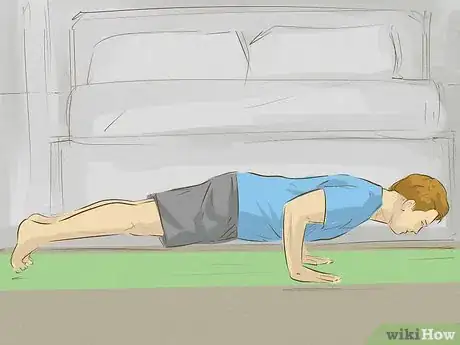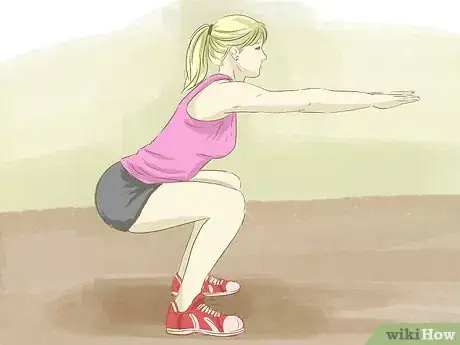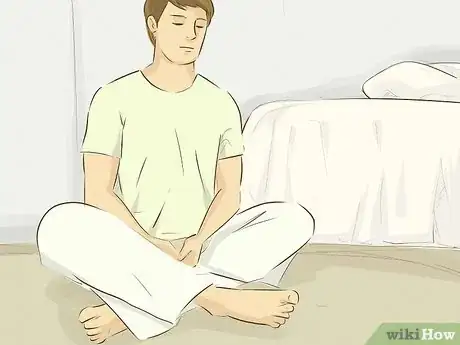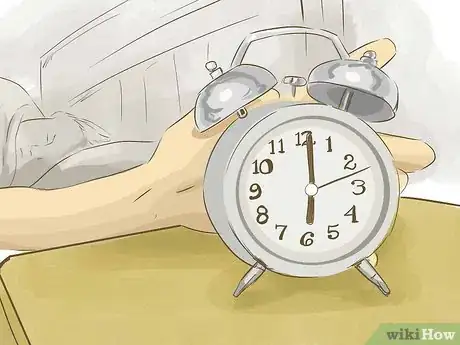This article was co-authored by Alex Dimitriu, MD. Alex Dimitriu, MD is the Owner of Menlo Park Psychiatry and Sleep Medicine, a clinic based in the San Francisco Bay Area with expertise in psychiatry, sleep, and transformational therapy. Alex earned his Doctor of Medicine from Stony Brook University in 2005 and graduated from the Stanford University School of Medicine's Sleep Medicine Residency Program in 2010. Professionally, Alex has dual board certification in psychiatry and sleep medicine.
There are 11 references cited in this article, which can be found at the bottom of the page.
wikiHow marks an article as reader-approved once it receives enough positive feedback. In this case, 89% of readers who voted found the article helpful, earning it our reader-approved status.
This article has been viewed 157,534 times.
If you find that it takes you forever to wake up, or that you feel like a zombie for the first few hours of the day, you’re not alone. This is a common occurrence and is caused by reduced blood flow and oxygen circulation in the body after sleeping all night. Luckily, by taking care of your body before and after you go to sleep and doing light stretches in the morning, you can improve how you feel every morning and feel able to take on the world right away.
Steps
Doing Morning Exercises
-
1Start your day with some light stretches to loosen up your muscles. Your body will feel pretty stiff after sleeping for 8 hours. Do light to moderate stretches in the first 5 minutes after you wake up to get energized and motivated in the morning.[1]
- In a standing position, lift one leg up until it’s parallel to the floor, then stretch your arms forward to touch your toes. Hold for 20 seconds then repeat with your other leg. This will stretch your hamstrings and legs.
- Rotate your arms like a windmill to stretch your arms and shoulders. Stretch your neck by tilting your chin downwards and upwards, then tilting your head to the left and to the right.
- You should push yourself to feel tension, but not pain. Stop performing a stretch if it starts to become painful.
-
2Do a set of push-ups and a set of sit-ups. Doing a few push-ups and sit-ups in the morning will help get your blood circulating and will also prime your muscles to make you more active throughout the day. Do 1 set each of push-ups and sit-ups, limiting yourself to completing as many as you feel comfortable doing without becoming exhausted.[2]
- Although push-ups are a great way to build muscle, you shouldn’t worry about that in this context; just do enough to get your heart pumping and your muscles very slightly sore.
- There’s no set guideline for how many sit-ups or push-ups to include in each set. If you feel comfortable, do 10 of each exercise.
Advertisement -
3Do a set of jumping jacks to engage your legs and shoulders. Jumping jacks are a terrific cardiovascular exercise that amps up your heart rate and also gives your legs and shoulders a workout. Do 30 to 50 jumps after you wake up to kickstart your heart rate and get energized right away.[3]
- If you can’t do 30 jumping jacks, consider doing 2 sets of 15 or 3 sets of 10 for the same end results.
- Make sure to do your jumping jacks after you’ve stretched to minimize the risk of injuring yourself.
-
4Perform a set of squats to kickstart your metabolism and build muscle. Squats work your largest muscle groups in your legs and thus have a tremendous boosting effect on your metabolism following a workout. Do squats after your morning stretches to get your body ready for the day and to improve your mobility, balance, and posture.[4]
- Squats are a great exercise for increasing the range of motion in your hips and ankles, which also helps to reduce lower back and knee pain. However, your knees should not cross the plane of your toes, otherwise it may damage the joints in your knees.
-
5Go for a run or walk. Running through the fresh air outside can refresh you and wake you up very quickly after you get out of bed. Consider going for a short 5-10 minute run in the morning to refresh yourself and feel energized for the rest of the day.[5]
- This doesn’t have to be a very fast run; going for a light jog will still boost your metabolism and give you a nice workout.
- If you can’t run, try walking for 30-40 minutes instead for roughly the same results.
Refreshing Your Body
-
1Drink a glass of water first thing in the morning. You may or may not feel like drinking water when you wake up, but in either case your body needs it. Down an 8 fluid ounces (240 mL) glass of water right after waking up to jump start your metabolism and to help you feel more alert.[6]
- If you leave early in the morning to go to work, try to drink a second glass of water as well before leaving your home. This will help you stay focused in the morning and encourage you to stay hydrated throughout the day.
- Consider filling a water bottle with a leak-proof top and leaving it on your night stand before going to bed.
-
2Eat a nutritious and filling breakfast. Starting off the day with a healthy breakfast will give you energy for the morning and prevent you from feeling groggy. Eat a breakfast that combines healthy carbs, fiber, and protein for an energizing start to your day.[7]
- Fruits, whole grain wheat, and simple proteins work best in the morning. Eggs, cheese, yogurt, or cottage cheese are also good options for morning meals.
- Avoid eating heavy carbs or large portions for breakfast; eating too much may cause you to feel more sluggish instead of energized.
-
3Meditate or perform breathing exercises to clear your mind. Doing breathing exercises or meditation in the morning can help give you a fresh mindset and get rid of anxiety or tension in your muscles. Meditate for 5 minutes each morning to start your day in a calm and relaxed state.[8]
- When doing deep breathing, take deep breaths into your stomach and hold them for 5-7 seconds before releasing them. You’ll find that tension in your body relaxes as you exhale.
-
4Hold off on drinking coffee until later in the day. Many of us drink coffee first thing in the morning. However, drinking coffee right after you wake up actually reduces the caffeine’s effect and makes you build a tolerance to the drug faster. Consider waiting a few hours before having your coffee to make sure you’re getting the full effect of the caffeine.[9]
- For example, if you wake up at 7:00, consider waiting until around 10:00 before having coffee.
- For even better results, cut coffee entirely out of your regular morning routine and only drink it on the days when you really need to (e.g., when you have to wake up earlier than usual).
Preparing the Night Before
-
1Relax and unwind for 1 hour before bedtime. If you’re stressed or overactive right up until you go to bed, it will take your body longer to fall into a restful sleep state. Give yourself an hour before you go to bed to unwind and do relaxing activities to help your body go to sleep faster.[10]
- Examples of some relaxing activities might include reading, watching your favorite TV show, or listening to soothing music.
- Meditating or performing breathing exercises is also a good way to relax your body and your mind as you prepare to go to sleep.
-
2Refrain from eating right before bed to avoid digesting food all night. Your body uses a lot of energy to slowly digest food, so if you eat a big meal before bed, you’ll digest that food all night and disrupt your sleep pattern. Eat your meals earlier in the evening to ensure your sleep is more restful.[11]
- If you absolutely can’t avoid eating right before bed, try to only eat a light meal and stick to foods that are the least disruptive to your sleep. These include cherries, bananas, rice, and turkey.[12]
- You should definitely avoid eating dark chocolate or drinking coffee or wine before bed.
-
3Drink a glass of water before bed to stay hydrated. Even when you’re asleep, your body is still carrying out a lot of its normal functions and will use up water in the process. Sip on some water before bed to keep your body hydrated, aid digestion, and help your body detox while you sleep.[13]
- Consider investing in a sports bottle with a sealable lid and keeping a filled one next to your bed. This will not only remind you to drink water before you go to bed, but will also give you a convenient source of water for after you wake up.
-
4Go to bed at the same time each night.[14] Your body has its own internal clock that it naturally follows, so going to sleep and waking up at regular times every day will help it feel energized and efficient. Pick a bedtime and stick to it each night to avoid feeling sluggish in the morning.[15]
- No matter what bedtime you choose, aim to get 7-8 hours of sleep each night.
- Stick to this sleep schedule even on weekends and days when you don’t have to wake up early. Your body will thank you for it![16]
-
5Wake up on time and don’t allow yourself to oversleep. Oversleeping can leave you feeling drained and sluggish in much the same way that not getting enough sleep can. Set alarms to go off roughly 8 hours after your bedtime and don’t let yourself sleep through them.[17]
- Consider using alarms that don’t include a snooze option. If you know your alarm won’t repeat itself, you’ll be more inclined to get out of bed and start your day after it goes off the first time.
- Try to avoid sleeping for more than 9 hours, as this may negatively affect your mood the next day.
Expert Q&A
-
QuestionWhy don't I feel good when I wake up?
 Alex Dimitriu, MDAlex Dimitriu, MD is the Owner of Menlo Park Psychiatry and Sleep Medicine, a clinic based in the San Francisco Bay Area with expertise in psychiatry, sleep, and transformational therapy. Alex earned his Doctor of Medicine from Stony Brook University in 2005 and graduated from the Stanford University School of Medicine's Sleep Medicine Residency Program in 2010. Professionally, Alex has dual board certification in psychiatry and sleep medicine.
Alex Dimitriu, MDAlex Dimitriu, MD is the Owner of Menlo Park Psychiatry and Sleep Medicine, a clinic based in the San Francisco Bay Area with expertise in psychiatry, sleep, and transformational therapy. Alex earned his Doctor of Medicine from Stony Brook University in 2005 and graduated from the Stanford University School of Medicine's Sleep Medicine Residency Program in 2010. Professionally, Alex has dual board certification in psychiatry and sleep medicine.
Sleep Medicine & Psychiatry Professional You might not be getting enough quality sleep every night. Go to bed and wake up at the same times every day, even on the weekends, and make sure you're avoiding bright lights and screens for 2 hours before bed. You should also try to get in some intense exercise each day so you sleep better.
You might not be getting enough quality sleep every night. Go to bed and wake up at the same times every day, even on the weekends, and make sure you're avoiding bright lights and screens for 2 hours before bed. You should also try to get in some intense exercise each day so you sleep better.
References
- ↑ https://www.prevention.com/fitness/g20436245/5-stretches-you-should-do-every-morning/
- ↑ https://www.fitday.com/fitness-articles/fitness/6-tips-for-being-on-your-phone-less.html
- ↑ https://www.fitday.com/fitness-articles/fitness/the-best-6-exercises-to-do-first-thing-in-the-morning.html
- ↑ https://www.mindbodygreen.com/0-18017/5-reasons-to-do-squats-every-day.html
- ↑ https://www.fitday.com/fitness-articles/fitness/the-best-6-exercises-to-do-first-thing-in-the-morning.html
- ↑ https://www.thedailymind.com/how-to/17-ways-to-wake-up-feeling-fresh-in-the-morning/
- ↑ https://www.health.com/health/gallery/0,,20676415,00.html#start-your-day-off-right-2
- ↑ https://www.thedailymind.com/how-to/17-ways-to-wake-up-feeling-fresh-in-the-morning/
- ↑ https://www.washingtonpost.com/news/wonk/wp/2015/06/01/when-to-drink-coffee-so-you-get-the-most-out-of-the-caffeine/?noredirect=on&utm_term=.936685afaee2
- ↑ https://www.outofstress.com/tired-in-the-morning/
- ↑ https://www.outofstress.com/tired-in-the-morning/
- ↑ https://www.health.com/health/gallery/0,,20628881,00.html
- ↑ https://www.lifehack.org/articles/lifestyle/15-ways-sleep-better-and-wake-refreshed.html
- ↑ Alex Dimitriu, MD. Sleep Specialist. Expert Interview. 16 October 2019.
- ↑ https://www.thedailymind.com/how-to/17-ways-to-wake-up-feeling-fresh-in-the-morning/
- ↑ Alex Dimitriu, MD. Sleep Specialist. Expert Interview. 16 October 2019.
- ↑ https://www.outofstress.com/tired-in-the-morning/
- ↑ Alex Dimitriu, MD. Sleep Specialist. Expert Interview. 16 October 2019.
About This Article
To feel great in the morning, try to go to sleep at the same time every night and wake up on time every morning. Drink a full glass of water as soon as you wake up to re-hydrate yourself and enjoy a nutritious, filling breakfast so you can start your day with energy. Meditating or performing breathing exercises in the morning can help you clear your mind and create a sense of calm, and doing a few light stretches can loosen up your muscles for the day ahead. For more tips on things you can do at night to ensure a great morning, read on!









































































